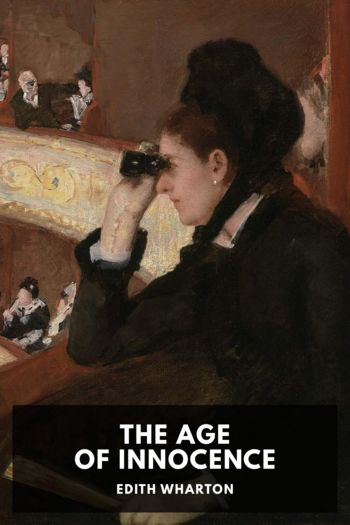The Age of Innocence, Edith Wharton [best 7 inch ereader txt] 📗

- Author: Edith Wharton
Book online «The Age of Innocence, Edith Wharton [best 7 inch ereader txt] 📗». Author Edith Wharton
Archer had left her with the conviction that Count Olenski’s accusation was not unfounded. The mysterious person who figured in his wife’s past as “the secretary” had probably not been unrewarded for his share in her escape. The conditions from which she had fled were intolerable, past speaking of, past believing: she was young, she was frightened, she was desperate—what more natural than that she should be grateful to her rescuer? The pity was that her gratitude put her, in the law’s eyes and the world’s, on a par with her abominable husband. Archer had made her understand this, as he was bound to do; he had also made her understand that simplehearted kindly New York, on whose larger charity she had apparently counted, was precisely the place where she could least hope for indulgence.
To have to make this fact plain to her—and to witness her resigned acceptance of it—had been intolerably painful to him. He felt himself drawn to her by obscure feelings of jealousy and pity, as if her dumbly-confessed error had put her at his mercy, humbling yet endearing her. He was glad it was to him she had revealed her secret, rather than to the cold scrutiny of Mr. Letterblair, or the embarrassed gaze of her family. He immediately took it upon himself to assure them both that she had given up her idea of seeking a divorce, basing her decision on the fact that she had understood the uselessness of the proceeding; and with infinite relief they had all turned their eyes from the “unpleasantness” she had spared them.
“I was sure Newland would manage it,” Mrs. Welland had said proudly of her future son-in-law; and old Mrs. Mingott, who had summoned him for a confidential interview, had congratulated him on his cleverness, and added impatiently: “Silly goose! I told her myself what nonsense it was. Wanting to pass herself off as Ellen Mingott and an old maid, when she has the luck to be a married woman and a Countess!”
These incidents had made the memory of his last talk with Madame Olenska so vivid to the young man that as the curtain fell on the parting of the two actors his eyes filled with tears, and he stood up to leave the theatre.
In doing so, he turned to the side of the house behind him, and saw the lady of whom he was thinking seated in a box with the Beauforts, Lawrence Lefferts and one or two other men. He had not spoken with her alone since their evening together, and had tried to avoid being with her in company; but now their eyes met, and as Mrs. Beaufort recognised him at the same time, and made her languid little gesture of invitation, it was impossible not to go into the box.
Beaufort and Lefferts made way for him, and after a few words with Mrs. Beaufort, who always preferred to look beautiful and not have to talk, Archer seated himself behind Madame Olenska. There was no one else in the box but Mr. Sillerton Jackson, who was telling Mrs. Beaufort in a confidential undertone about Mrs. Lemuel Struthers’s last Sunday reception (where some people reported that there had been dancing). Under cover of this circumstantial narrative, to which Mrs. Beaufort listened with her perfect smile, and her head at just the right angle to be seen in profile from the stalls, Madame Olenska turned and spoke in a low voice.
“Do you think,” she asked, glancing toward the stage, “he will send her a bunch of yellow roses tomorrow morning?”
Archer reddened, and his heart gave a leap of surprise. He had called only twice on Madame Olenska, and each time he had sent her a box of yellow roses, and each time without a card. She had never before made any allusion to the flowers, and he supposed she had never thought of him as the sender. Now her sudden recognition of the gift, and her associating it with the tender leave-taking on the stage, filled him with an agitated pleasure.
“I was thinking of that too—I was going to leave the theatre in order to take the picture away with me,” he said.
To his surprise her colour rose, reluctantly and duskily. She looked down at the mother-of-pearl opera-glass in her smoothly gloved hands, and said, after a pause: “What do you do while May is away?”
“I stick to my work,” he answered, faintly annoyed by the question.
In obedience to a long-established habit, the Wellands had left the previous week for St. Augustine, where, out of regard for the supposed susceptibility of Mr. Welland’s bronchial tubes, they always spent the latter part of the winter. Mr. Welland was a mild and silent man, with no opinions but with many habits. With these habits none might interfere; and one of them demanded that his wife and daughter should always go with him on his annual journey to the south. To preserve an unbroken domesticity was essential to his peace of mind; he would not have known where his hairbrushes were, or how to provide stamps for his letters, if Mrs. Welland had not been there to tell him.
As all the members of the family adored each other, and as Mr. Welland was the central object of their idolatry, it never occurred to his wife and May to let him go to St. Augustine alone; and his sons, who were both in the law, and could not leave New York during the winter, always joined him for Easter and travelled back with him.
It was





Comments (0)